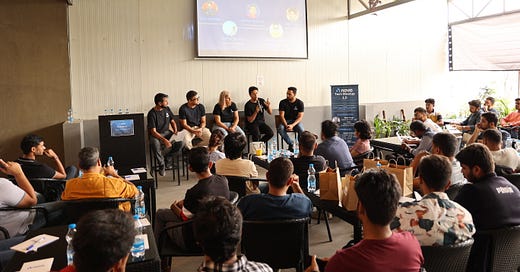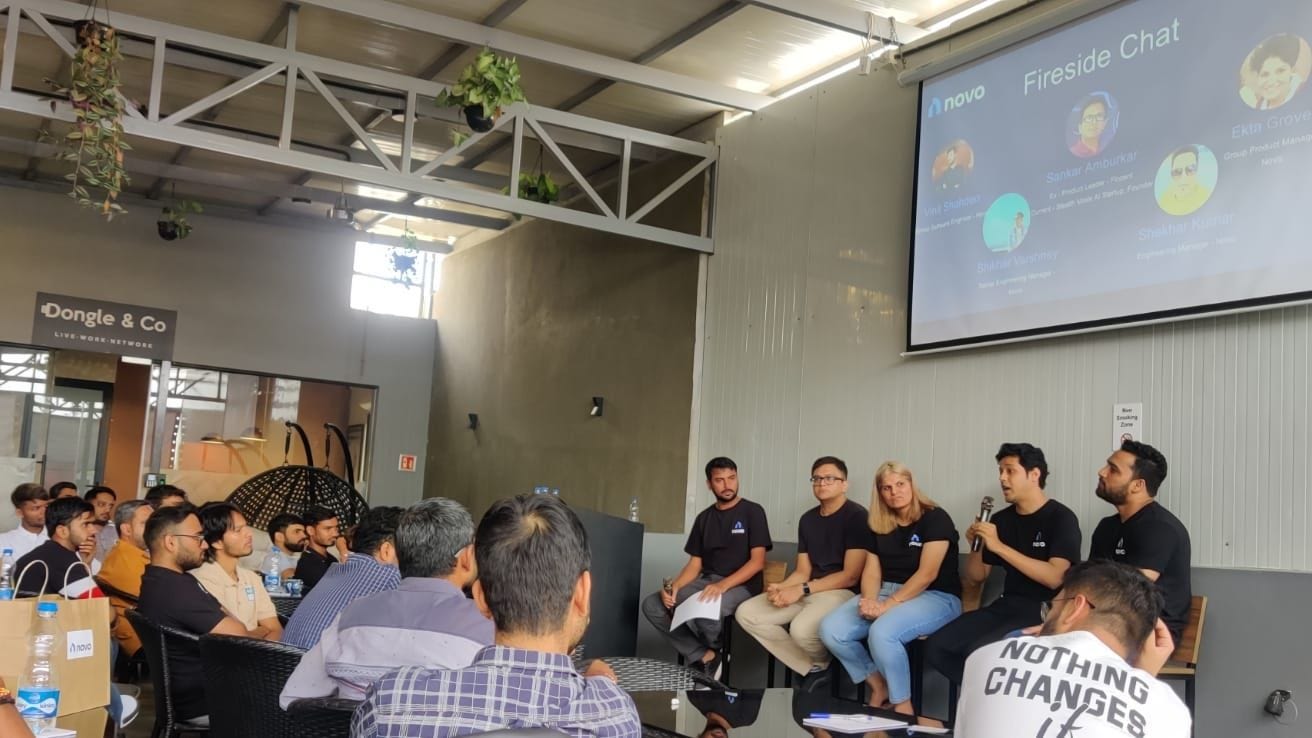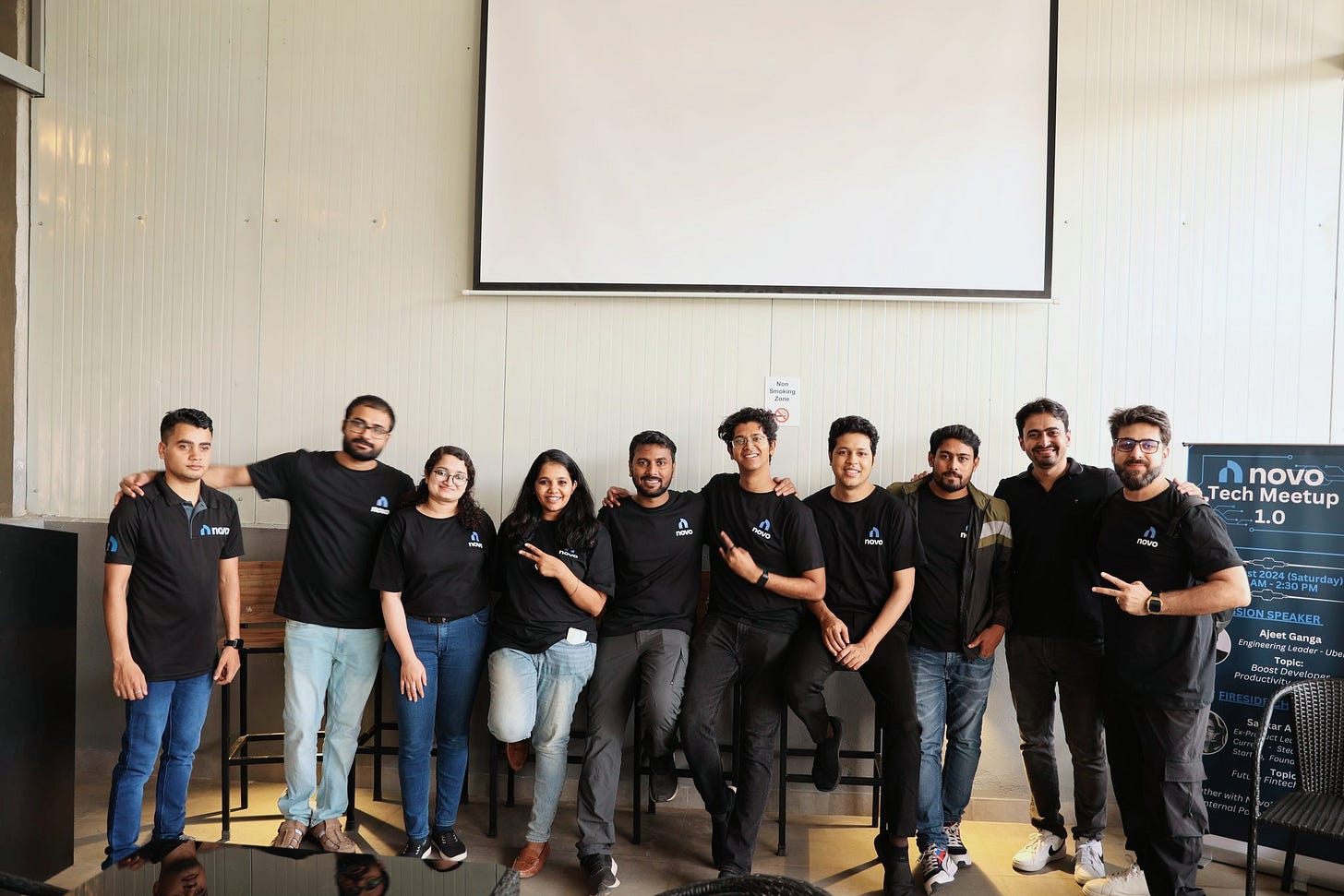The Future of Fintech: Insights from Industry Leaders at the Novo Tech Meetup
Highlights from Novo's Fintech Meetup: Expert Insights on GenAI, Blockchain, UPI, and more
Technology is transforming every aspect of our lives today, with the fintech industry at the forefront of this change. At Novo Tech Meetup 1.0, we recently held a fireside chat with some of the top fintech experts to talk about Fintech's future.
Over 100 people attended the event, all keen to learn from the seasoned professionals who have played a key role in shaping the FinTech and AI landscape in their respective organizations. I had the privilege of moderating and hosting the conversation on fintech's future, and in this post, I'll share some of the key takeaways from our discussions.
Let’s dive in!
A Glimpse into the Future of Fintech
Our panel featured some of the most respected voices in the fintech industry:
Ekta: With over 15 years of experience, Ekta is a Group Product Manager at Novo, passionate about creating exceptional customer experiences to revolutionize the back offices of SMBs and meet their financial needs.
Sankar: A thought leader in the fintech space, Sankar has served as VP at Instamojo and has closely witnessed the growth of Indian fintech.
Shekhar: An Engineering Manager at Novo, exploring the potential of blockchain and cryptocurrency. With experience at companies like Bloomreach and Unacademy, they bring valuable expertise in fintech innovation.
Shikhar: A Senior Engineering Manager at Novo, Shikhar has led the Credit Division for over two years, overseeing key innovations in credit solutions.
The discussion covered a wide range of topics, from the impact of Generative AI on core fintech areas to the potential of UPI as a global model. Here’s a recap of some of the most insightful conversations.
1. Fintech Ecosystems: India vs. USA
I began by asking Sankar how he sees the fintech ecosystems evolving differently in India and the USA. He noted that while both countries see rapid innovation, the approaches are distinct. In India, the focus has been on financial inclusion and creating a robust digital payment infrastructure, as seen with UPI. Conversely, the USA is leveraging fintech to enhance existing systems, with a growing emphasis on open banking and API integrations.
2. The Role of Generative AI in Fintech
With Generative AI being the new poster child of AI applications, I was curious to know Ekta’s thoughts on how it will transform the fintech industry, particularly in payments, lending, and wealth management. She highlighted that while AI has long been used for fraud detection, Generative AI opens new avenues for personalized financial services. From chatbots that offer tailored financial advice to algorithms that predict creditworthiness, the potential is vast. She also shared some innovative use cases, including AI-driven investment platforms that learn and adapt to users' financial behaviors.
3. Technologies Beyond AI
I then asked the panel about other technologies that will significantly impact fintech in the coming years. Shekhar pointed to blockchain and cryptocurrency as key areas to watch. These technologies, they explained, will not only enhance security and efficiency but also open new possibilities for decentralization and faster transaction processing.
4. Addressing Cybersecurity Threats
With the rise in data breaches and synthetic identity fraud, Sankar provided insights into how the fintech industry is addressing these challenges. He emphasized the importance of adopting multi-layered security protocols, leveraging AI for real-time threat detection, and ensuring compliance with evolving regulatory frameworks.
5. UPI as a Global Model
Given UPI’s massive success in India, Shikhar was asked whether it could serve as a global model. He expressed optimism, citing the simplicity and efficiency of UPI. However, he also noted the challenges of replicating this success in other countries due to differing regulatory environments. He also mentioned FedNow in the US, which aims to replicate UPI’s success by offering instant payment services, though with its unique set of challenges and opportunities.
6. The Future of Cryptocurrency and Blockchain
Shekhar shared his thoughts on the future of cryptocurrency and blockchain in both India and the US. He believes that while regulation remains a hurdle, the underlying blockchain technology will continue to disrupt industries beyond finance. He foresees a future where decentralized finance (DeFi) and smart contracts become mainstream, offering new ways for people to interact with money and assets.
7. The Rise of Buy Now, Pay Later (BNPL)
I also asked Shikhar about the growing popularity of Buy Now, Pay Later (BNPL) services—In India, apps like LazyPay and Simple are prominent examples. He identified both opportunities and challenges in this space, particularly around consumer debt and regulatory scrutiny. He noted that while BNPL offers convenience, it also requires responsible lending practices to avoid a debt trap for consumers.
8. Open Banking API Integrations
Sankar discussed the transformative potential of Open Banking API integrations. He described them as game-changers, enabling fintech companies to offer more personalized and connected financial services. By allowing third-party developers to build on existing banking infrastructure, open banking fosters innovation and competition, ultimately benefiting consumers.
9. The Future of Neo-Banks
Ekta weighed in on the debate about whether neo-banks will replace traditional banks or if we’ll see more partnerships between the two. She believes that while neo-banks offer unique advantages in terms of user experience and agility, traditional banks still hold significant value in terms of trust and regulatory compliance. The future, she predicts, will see more collaborations rather than outright competition.
10. Talent in Fintech: Skills and Hiring
Finally, Shekhar addressed the future of talent in the fintech industry. With the sector poised for continued growth, he highlighted the most in-demand skills, including expertise in AI, blockchain, cybersecurity, and data analytics. He also shared strategies for attracting and retaining top talent, emphasizing the importance of a strong company culture and continuous learning opportunities.



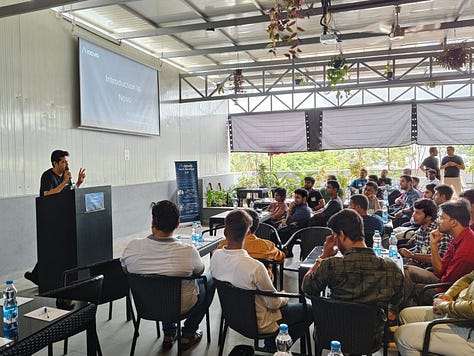

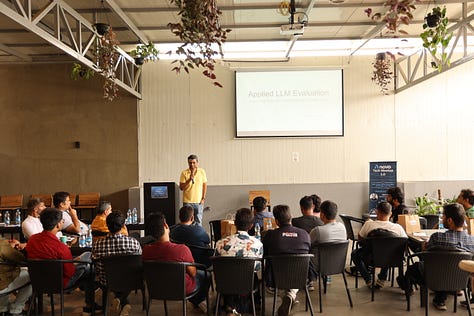
Conclusion
The fireside chat was a fascinating exploration of the future of fintech, but it also comes with challenges. We need to focus on innovation while also being careful about privacy, security, and regulations. Fintech should help everyone, not just a few people. By focusing on these things, we can make fintech a force for good.
Gratitude
A big thank you to our incredible panelists—Ekta, Sankar, Shekhar, and Shikhar—for sharing such valuable insights. These discussions will help shape our approach to building the future of fintech.
Also, a special shoutout to the Novo team for organizing a fantastic meetup!
If you’re as passionate about fintech as we are at Novo, keep an eye out for more insights and upcoming events—follow Novo India on LinkedIn.

